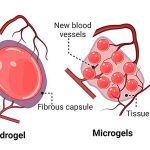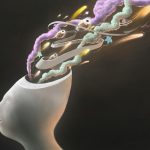New drug shows promise in treating liver disease
Liver disease is a common condition affecting millions of adults in the United States.
One serious form of this disease is nonalcoholic fatty liver disease...
This electric bandage could speed up wound recovery
Researchers have created an affordable bandage that uses electricity to help heal chronic wounds faster.
In animal tests, wounds treated with these special bandages healed...
Supercharged silk: The future of healing hearts and wounds
Researchers at UNSW have made an exciting breakthrough using silk from domestic silk moths.
This silk, transformed into a special jelly-like material called microgel, has...
Research finds link between high blood pressure and migraine in women
A recent study published in Neurology on July 31, 2024, has found that high diastolic blood pressure is linked to a slightly increased likelihood...
People have lower risks of heart attacks and strokes after COVID-19 vaccination
A study published in Nature Communications has found that the rates of heart attacks and strokes decreased after COVID-19 vaccination compared to before or...
New blood test can detect early Alzheimer’s with 90% accuracy
A new test that measures key proteins in the blood has shown to be much more accurate than doctor assessments in identifying Alzheimer's disease...
How to treat and prevent chronic liver disease
Chronic liver disease is a long-term condition that can damage the liver and affect its ability to function properly. The liver is a vital...
Common causes of brain cancer explained
Brain cancer is a serious and often mysterious disease that affects many people around the world. It starts when cells in the brain grow...
These things can reduce your death risk after surgery
A recent study from Michigan Medicine has found that living in an under-resourced neighborhood can significantly impact a person's recovery from surgery, even when...
Scientists find new way to treat persistent high blood pressure
High blood pressure, also known as hypertension, is a common health issue in the United States that can be difficult to manage.
Even with available...










